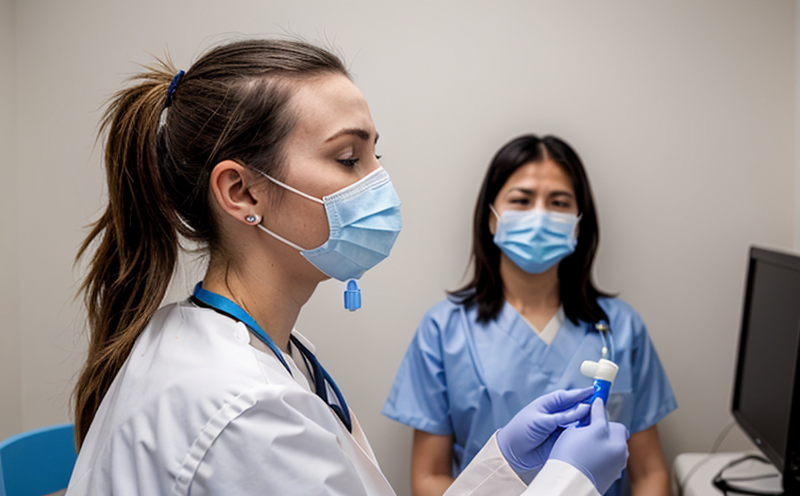Environmental Respiratory Pathogen Screening in Poultry Houses
In the poultry industry, maintaining optimal health and productivity is critical. Environmental respiratory pathogen screening plays a pivotal role in identifying potential threats that can impact flock health and productivity. This service focuses on detecting and quantifying respiratory pathogens present in the environment of poultry houses, ensuring a safer and healthier environment for both birds and human handlers.
The process involves collecting air samples from various locations within the poultry house using specialized sampling devices. These samples are then analyzed using advanced laboratory techniques to identify the presence of common respiratory pathogens such as Escherichia coli, Mycoplasma gallisepticum, and Bordetella avium. By identifying these pathogens early, poultry farmers can implement targeted interventions to prevent disease outbreaks.
The first step in this process is the collection of air samples from different areas within the poultry house. This includes sampling near feeding stations, roosting areas, and other high-traffic zones. The samples are then transported back to our laboratory for analysis. In the lab, we use quantitative PCR (qPCR) testing to determine the presence and concentration levels of respiratory pathogens in the environment.
The results of this environmental screening provide valuable insights into the health status of the poultry house. This information can be used to make informed decisions about flock management practices. For instance, if high levels of Escherichia coli are detected, it may indicate poor hygiene or overcrowding in certain areas of the house. Such findings allow for targeted improvements that enhance overall flock health.
This service is particularly beneficial for poultry farmers and quality managers looking to maintain a disease-free environment. By proactively addressing environmental factors that contribute to respiratory illness, we help ensure higher bird welfare and productivity. The data provided by this screening process can also be used for compliance purposes, ensuring adherence to industry standards and regulations.
The use of advanced qPCR technology ensures accurate and reliable results, providing peace of mind for those responsible for the health and well-being of poultry in their care. This service is an essential tool in a comprehensive approach to disease prevention and management in the poultry industry.
| Pathogen | Description | Significance |
|---|---|---|
| Escherichia coli | A common bacterium found in the intestines of humans and animals. It can cause respiratory issues. | Potential risk to bird health and productivity. |
| Mycoplasma gallisepticum | A type of mycoplasma that causes chronic respiratory disease in poultry. | Highly contagious and can spread rapidly within a flock. |
| Bordetella avium | A bacterium that is a common cause of respiratory diseases in poultry. | Can lead to significant economic losses due to decreased egg production. |
In summary, environmental respiratory pathogen screening provides valuable insights into the health status of the environment within poultry houses. By identifying and quantifying pathogens early, this service enables proactive measures that enhance bird welfare and productivity while ensuring compliance with industry standards.
Industry Applications
The primary application of environmental respiratory pathogen screening in poultry houses is to maintain a disease-free environment for both birds and human handlers. This service is particularly beneficial for large-scale poultry farms, hatcheries, and research facilities where maintaining optimal health conditions is crucial.
- Preventative Measures: By identifying potential threats early, farmers can implement targeted interventions to prevent disease outbreaks.
- Enhanced Productivity: Ensuring a healthier environment leads to increased productivity and better welfare for the birds.
- Compliance: This service helps poultry farms comply with industry standards and regulations related to animal health and welfare.
The results of this screening can also be used by researchers to study the prevalence of respiratory pathogens in different regions or under various environmental conditions. This information is valuable for developing new strategies to improve flock health and productivity.
Environmental and Sustainability Contributions
By detecting and managing respiratory pathogens early, this service contributes significantly to maintaining a sustainable poultry industry. A disease-free environment reduces the risk of antibiotic resistance and unnecessary use of antibiotics, which is crucial for sustainable animal husbandry practices.
The accurate identification of pathogens allows for targeted interventions that minimize the spread of diseases within the flock, thereby reducing the need for prophylactic treatments. This approach not only enhances bird welfare but also supports environmental sustainability by preventing the overuse of antimicrobial agents, which can have negative impacts on ecosystems and human health.
The results of this service can be used to inform best practices in poultry housing design and management. By identifying high-risk areas within the house, farmers can make informed decisions about improving ventilation systems or adjusting bird densities to reduce stress factors that may contribute to respiratory illness.
Additionally, this service supports sustainable development goals by promoting responsible animal husbandry practices. Ensuring a healthy environment for poultry not only benefits the animals but also contributes positively to global food security and economic stability in the agricultural sector.
Competitive Advantage and Market Impact
The ability to detect respiratory pathogens early provides a competitive edge in the poultry industry. Farmers who can ensure their flocks are disease-free not only maintain high productivity levels but also avoid costly outbreaks of diseases that can significantly impact production.
- Increased Productivity: Healthy birds lead to higher egg and meat yields, enhancing profitability for farmers.
- Better Reputation: Ensuring the health and welfare of poultry enhances the reputation of farms among consumers who value ethical and sustainable practices.
- Regulatory Compliance: This service helps in meeting stringent regulatory requirements, which is crucial for maintaining a competitive edge in international markets.
The demand for high-quality, disease-free poultry products continues to grow, driven by consumer preferences for healthier food options. By offering this service, we help our clients meet these demands and stay ahead of the competition. Additionally, the data provided by this screening process can be used to demonstrate a commitment to sustainable practices, which is increasingly important in today’s market.





